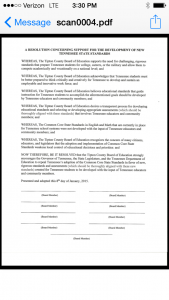Grace Tatter over at Chalkbeat has a story about Tennessee’s RTI2 program implementation in which she notes that the program’s mandates have come largely unfunded by the State of Tennessee.
The Response to Intervention and Instruction program is designed to identify students who are struggling and get them extra assistance before they fall too far behind.
In practice, the program means many students miss related arts or even social studies and science in order to spend extra time in remediation for math and reading, the two subjects tested on the state’s TCAP test.
Additionally, many districts report they lack the funding to provide subject-matter teachers and so individuals not certified in math or reading may be in charge of certain remediation classrooms.
Tatter notes:
Districts have had to spend hundreds of thousands of dollars on assessments, and don’t have the money to hire educators with the expertise required to work with the highest needs students. Some schools are using their general education teachers, already stretched thin, and others are using computer programs.
The state’s RTI2 policy identifies the intervention levels for students:
According to the state RTI2 policy, students should be divided into three groups: the majority, on grade level, are in Tier 1, students in the bottom 25th percentile of students across the country are in Tier 2, and students in the bottom 10th percentile are in Tier 3.
All students, regardless of tier, get an hour of intervention time a day. For Tier 2 and Tier 3, intervention time is spent in small groups, ideally of fewer than five students, working on specific skills, while for kids in Tier 1 it might be enrichment activities.
Tatter notes that Metro Nashville Public Schools is among the districts taking advantage of the flexibility offered by the state to serve a smaller pool of students.
Essentially, if a district feels it lacks adequate resources to provide services to the bottom 25 perfcent of students, it can shift down to a smaller number, 16% in Tier 2 in MNPS for example, and the bottom 7% in Tier 3.
The shift at MNPS means they can focus on a smaller pool, but it also highlights the challenge faced by districts across the state. That is, those districts with higher concentrations of poverty (and likely to have higher numbers of students needing intervention) also have the least resources available to assist students. The poorest districts, then, are left further behind as a result of a well-intentioned unfunded state mandate.
Tatter notes that education researchers and practitioners believe RTI2 can work and work well, but without proper support, many districts are struggling to make that happen.
More on RTI2 from our friends over at Bluff City Ed
For more on education politics and policy in Tennessee, follow @TNEdReport

